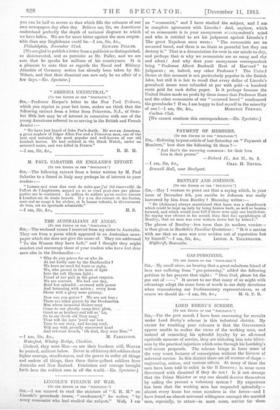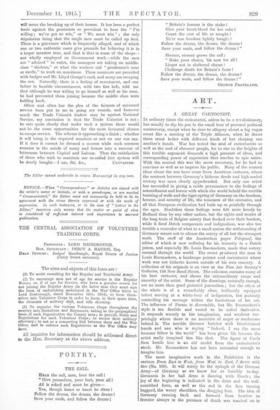LORD DERBY'S SCHEME.
To xmo EDITOR OF rum " SPECTATOR.") SI11,—For the past month I have been canvassing for recruits under Lord Derby's scheme in this industrial district. My excuse for troubling your columns is that the Government appear unable to realize the views of the working man, and instead of cementing his splendid loyalty by an all-round equitable measure of service, they are irritating him into bitter- ness by the practical injustices which arise through his Lordship's well-meant proposals. The scheme brings in force some of the very worst features of conscription without the fairness of universal service. In this district there are all manner of shops-- engineering, cotton, and various others. At many of these the men have been told to enlist in the B Reserve ; in some cases threatened with dismissal if they do not ! Is it not strange that the Prime Minister or any one should deceive themselves by calling the present a voluntary system ? My experience has been that the working man has responded splendidly—. almost every home has some members in the forces—and I have found an almost universal willingness amongst the married men, especially, to attest—in most cases, service for these will mean the breaking up of their homes. It has been a perfect tonio against the pessimism so prevalent to hoar the "I'm willing ; we've got to win," or "We must win " ; the only stipulation being that the single men must be called up first. There is a grievance which is frequently alleged, and of which one or two authentic eases give grounds for believing it is in a larger measure true, and that is that in some of the shops— not wholly employed on Government work—while the men are " advised " to enlist, the managers are taking on middle- class "shirkers," or what the workers call "gentlemen's sons or swells," to work on munitions. These amateurs are provided with badges and Mr. Lloyd George's card, and many are escaping the not. Naturally, there is a feeling of resentment, and one father in humble circumstances, with two fine lads, told me that although he was willing to go himself as well as his sons, he had prevented them joining because the middle class were holding back.
Often and often has the plea of the fairness of universal service been put to me in going my rounds, and however much the Trade Unionist leaders may be against National Service, my conviction is that the Trade Unionist is not ; he sees quite clearly that under such a system there would not be the same opportunities for the more favoured classes to escape service. The scheme is approaching a finish ; whether it will bring in the required numbers or not no one can say. If it does it cannot be deemed a success while such soreness remains in the minds of many and festers into a rancour of bitterness between Capital and Labour. Thus the satisfaction of those who wish to maintain our so-called free system will
be dearly bought.—I am, Sir, &c., CANVASSER.



















































 Previous page
Previous page